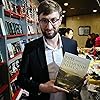Amel Lou
asked
Scott Hawkins:
Maupassant said that talented authors should be called illusionists because of how they can write on something unreal and make it feel like real life. Well let me tell you that you're a hell of an illusionist. Your book was extraordinary and I've never ever read something similar in my life. Props for the originality. So, I was wondering how did you come up with the idea of the Palapi language? Thanks!
Scott Hawkins
Hi Amel,
Thanks! I'm glad you liked it, and it's a huge relief that some of that is finally making it onto the page. The worst part about starting out as a writer is that when you do the book, it's always vivid to you. Mount Char is my first published novel, but the fourth one I wrote The thing is, this one is no more or less vivid to me than were the other three. Reader reactions indicate that I am alone in this. :-)
Anyway, as far as Pelapi--that was one of the core ideas of the book, but it mutated a little during the writing process. The gist of it is this:
When I was at school I took a lot of courses that dealt with the sub-field of artificial intelligence called natural language processing (NLP). NLP is the attempt to get machines to understand written and/or spoken languages that people use--Spanish, English, French, whatever. So I spent a lot of years gazing into my navel and trying to figure out what we really mean by 'understand' and 'communicate' and 'think.'
One of the things that came up during this time is a notion called the Sapir-Worf hypothesis. That says, essentially, that the language you think in to a large extent determines what you can think about. There does appear to be some truth to this notion.
For instance, I (vaguely) remember reading an article about how tribesmen from the amazon were being displaced by deforestation. These guys had essentially grown up in the stone age, but when the logging company moved in they had to move to Sao Paolo or wherever. So all of a sudden they're surrounded by TV, cell phones, all that stuff. Naturally they were curious, but when people tried to explain to them how it worked, they ran into a language barrier--these guys just didn't have the notion of "electromagnetic spectrum" and "radio" in their language. Cell phones had to be explained in terms of "the invisible sky spirit carries the message" or whatever. And no matter how you explained it, it was still going to look an awful lot like magic.
So, one of the core notions of Mount Char was to turn this on its head. It crossed my mind that these fish-out-of-water tribesmen might have words in their language for thinking about reality, manipulating reality, in ways that look an awful lot like magic to modern eyes.
As originally conceived Mount Char was going to be more of a fish-out-of-water comedy type of thing. This REALLY old dude who grew up thinking in neolithic language had somehow stumbled on the secret of immortality and is now living in the suburbs. He's lonely because he doesn't have anyone to talk to--he's fluent in English, of course, but there's no one who understands how the world really works under the hood. So he takes these kids and teaches them in the old ways so he'll have someone to talk to. Eventually you end up with this one peculiar neighborhood where they can (for instance) raise the dead, but nobody knows how to make a phone call. I thought there was some comedic potential there.
Anyway, that was fine, as far as it went, but then we needed an antagonist, and so forth and so on. So the emphasis shifted a little bit.
Anyway, thanks for the question & hope that helps!
Best,
Scott
Thanks! I'm glad you liked it, and it's a huge relief that some of that is finally making it onto the page. The worst part about starting out as a writer is that when you do the book, it's always vivid to you. Mount Char is my first published novel, but the fourth one I wrote The thing is, this one is no more or less vivid to me than were the other three. Reader reactions indicate that I am alone in this. :-)
Anyway, as far as Pelapi--that was one of the core ideas of the book, but it mutated a little during the writing process. The gist of it is this:
When I was at school I took a lot of courses that dealt with the sub-field of artificial intelligence called natural language processing (NLP). NLP is the attempt to get machines to understand written and/or spoken languages that people use--Spanish, English, French, whatever. So I spent a lot of years gazing into my navel and trying to figure out what we really mean by 'understand' and 'communicate' and 'think.'
One of the things that came up during this time is a notion called the Sapir-Worf hypothesis. That says, essentially, that the language you think in to a large extent determines what you can think about. There does appear to be some truth to this notion.
For instance, I (vaguely) remember reading an article about how tribesmen from the amazon were being displaced by deforestation. These guys had essentially grown up in the stone age, but when the logging company moved in they had to move to Sao Paolo or wherever. So all of a sudden they're surrounded by TV, cell phones, all that stuff. Naturally they were curious, but when people tried to explain to them how it worked, they ran into a language barrier--these guys just didn't have the notion of "electromagnetic spectrum" and "radio" in their language. Cell phones had to be explained in terms of "the invisible sky spirit carries the message" or whatever. And no matter how you explained it, it was still going to look an awful lot like magic.
So, one of the core notions of Mount Char was to turn this on its head. It crossed my mind that these fish-out-of-water tribesmen might have words in their language for thinking about reality, manipulating reality, in ways that look an awful lot like magic to modern eyes.
As originally conceived Mount Char was going to be more of a fish-out-of-water comedy type of thing. This REALLY old dude who grew up thinking in neolithic language had somehow stumbled on the secret of immortality and is now living in the suburbs. He's lonely because he doesn't have anyone to talk to--he's fluent in English, of course, but there's no one who understands how the world really works under the hood. So he takes these kids and teaches them in the old ways so he'll have someone to talk to. Eventually you end up with this one peculiar neighborhood where they can (for instance) raise the dead, but nobody knows how to make a phone call. I thought there was some comedic potential there.
Anyway, that was fine, as far as it went, but then we needed an antagonist, and so forth and so on. So the emphasis shifted a little bit.
Anyway, thanks for the question & hope that helps!
Best,
Scott
More Answered Questions
Christopher Farrell
asked
Scott Hawkins:
Hi Scott! I'm a bookseller in a small mall and I have been doing everything to handsell your book - it's the most interesting, original book I've read in years. I know you have a prequel story coming, but stories about the Librarians would be appreciated! (More Peter, please - he takes after the cook buried in my own heart) What was your research like for this book?
About Goodreads Q&A
Ask and answer questions about books!
You can pose questions to the Goodreads community with Reader Q&A, or ask your favorite author a question with Ask the Author.
See Featured Authors Answering Questions
Learn more





